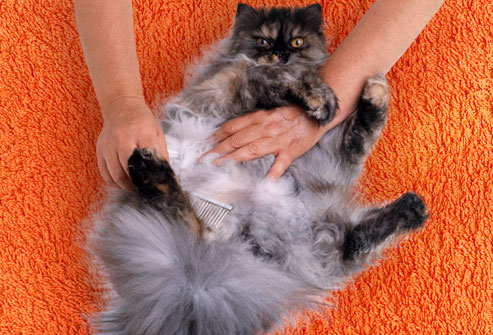Fleas are probably the most bothersome parasites that infest your house and backyard. Your pets are usually responsible for carrying these little bloodsucking insects into your home. Fleas multiply at rapid speeds as soon as they are inside your house, infesting your carpets, lawns and any other dry out of sight space they can find. It might be quite tricky to drive fleas out of your house for good as it involves ridding your pets of them and then cleaning almost every surface and corner in and around your house. Here are some of the best ways to get rid of fleas permanently.
How to get rid of fleas on your dogs or cats?
Giving your pet a bath
Bathing your pet with an effective flea shampoo is the easiest and fastest way to remove the parasites from them. Make sure to pick a mild (preferably herbal) product as those containing chemical insecticides like pyrethrins, chlorpyrifos and carbaryl might be harmful for both dogs and cats. You may use a baby shampoo, but any other human shampoo may irritate their skin. Here are some tips for best results:
- Make sure to wet the neck, eye cavities, ears and rectum before the rest of the body to prevent the fleas from finding shelter in these places during the bath.
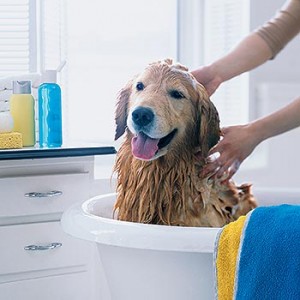
- Lather your pet for around 15 minutes so the fleas do not stand a chance of surviving.
- Then, rinse them properly under lukewarm water for as long as it takes for cleansing the shampoo and soaking any possible hiding places for the parasites.
Medical Treatments
Oral suspensions and topical treatments are available for cats and dogs. The oral solutions are mixed with your pet’s food to be absorbed into their bloodstream. Then, the suspensions enter the flea’s body (when they bite) and prevent them from reproducing. Topical solutions are applied externally to kill the adult fleas. You can also opt for flea tablets and pills meant for dogs and cats. Contact a vet to know about the best products for your pet and their application.
How to get rid of fleas on your pets naturally?
Essential oils
Suitable options include eucalyptus, tea tree, lavender and cedar wood essential oils. Adding a few drops of essential oil to the bathing water can repel fleas, while spraying your pet with an essential oil mixture before giving them a bath is another effective way. However, cats are often extremely sensitive to these oils. Additionally, their habit of licking themselves also makes the application of essential oils quite tricky.
Flea spray
There are many ways of preparing a natural citrus flea repellant spray, with lemon juice, apple cider vinegar and white distilled vinegar being commonly used for the purpose.

- Add a cup of apple cider vinegar or white vinegar (or a combination of both) to 1 quart of water and use the mixture to spray your pet.
- Another option is to cut a fresh lemon into slices and keep it immersed in warm water overnight to use the solution as an anti-flea spray.
Flea collar
Although commercial flea collars are available in the market, making one for your pet on your own is not a difficult job. Add 2-3 drops of lavender or cedar essential oil to 1-2 tablespoon water. Apply 8-10 drops of the mixture to a bandanna and tie it round your pet’s neck to control the fleas infesting their head and neck area. Make sure to reapply the oil mixture to the bandanna once a week.
Flea bag
Take two 6 inch square pieces of a breathable fabric and sew three sides together to create a small pouch. Fill the pouch with 1 lemon peel, a fistful of cedar chips and a few teaspoons of lavender before tying it with a string or ribbon. Now place the flea bag near or under your pet’s bedding to keep fleas away.
Other Home Remedies
- Rosemary: Boil 2 cups of rosemary leaves in some water for 30 minutes, strain the water and mix it with one gallon warm water. Then soak your pet in the rosemary water and allow them to air dry instead of drying them with a towel.
- Diatomaceous earth: Dusting your pet with some food grade diatomaceous earth (DE) is a good idea as this white powder made from fossilized hard-shelled algae is like shards of glass for the fleas, dehydrating and killing them after coming into contact. The food grade DE is harmless for your pets and children, even if ingested. Make sure to wear gloves before handling your pet to prevent the fleas from affecting you.
- Yeast: Rub some brewer’s yeast onto your pet’s skin or mix a small amount of yeast powder to their food as fleas do not like its taste.
- Garlic: Adding considerable amounts of garlic to your dog’s food is believed to prevent flea infestation
- Flea Repellant Drink: Adding 1 teaspoon apple cider vinegar or white vinegar to each quart of your pet’s drinking water deters fleas (for a 40 pound dog).
Other measures for getting rid of fleas
A flea comb can effectively eliminate 10-50% of the fleas from your pet. Using a comb after applying a flea spray (after it dries) is even more effective. Make sure to dip the comb into a bowl of soapy water after each brush to drown the fleas.
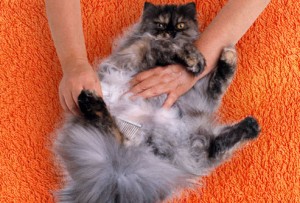
Natural ways to get rid of fleas on puppies and kittens
Having fleas can cause serious health issues (e.g. severe anemia) in puppies and kittens. Bathing them with warm water and a mild soap is the safest way to eliminate the fleas as puppies and kittens are sensitive to essential oils or any other natural remedies. Combing them with a flea comb following the bath is effective as well.
How to get rid of fleas in your house?
Laundering your pet’s bedding and clothes
Wash everything your dog or cat regularly lies, sits or sleeps in. This may include their bedding, doormats, bed sheets, curtains as well as sofa and cushion covers. Putting the bedding into the dryer for 15 to 20 minutes (if possible) helps to kill the adults, larvae as well as the eggs.
Vacuuming your house
Vacuum every surface and corner in your home where the bloodsucking bugs may have taken shelter. Sprinkling your carpets with some baking soda, salt or borax, about one hour before vacuuming, produces better results. Make sure the powder reaches the base of the carpet so that it can destroy the larvae and eggs lying deep into the carpet.
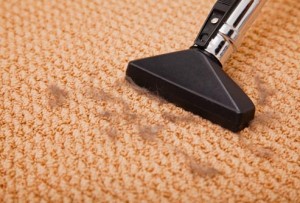
Dispose of the vacuum bag once full by sealing it in a plastic bag and throwing it away in a sealed trash can. Otherwise, the fleas may come back to infest your home again.
De-humidify your rooms
Fleas need over 50% relative humidity to survive; so, using a de-humidifier for a couple of days to keep the humidity levels below the 50% mark kills the adults, larvae and also prevents the existing eggs from hatching. All you need to do after that is vacuuming the flea debris.
Getting rid of fleas in the yard
Cleaning any damp dark areas in your backyard, exposing these places to sunlight, getting rid of weeds and trimming the grass short helps to keep the parasites off your yard and house.
Other tips for getting rid of fleas in your house
- Spraying your carpets and floors with an aerosol insecticide
- Mixing some esfenvalerate with water and applying it on the yard
- Placing some banana peels facing up on heavily infested places is a cheap way of killing fleas quickly
- Using a flea bomb (you will have to clean your house and everything in it after application)
- Fogging your home to destroy flea infestations; you can call an exterminator to do the job as well
The time required to get rid of the parasitic insects varies from a couple of weeks to a month, depending on how much effort you put into it.
Follow-up Measures for Preventing a Future Infestation
- Making sure to vacuum the carpets, floors and mattresses in your house even after getting rid of the fleas to remove any remaining eggs that might hatch and start the infestation all over again.
- Mowing your lawn regularly.
- Washing all pet bedding in warm soapy water once or twice a week.
- Setting up flea traps by placing a shallow dish of soapy water on the floor, under a small light bulb. Fleas are attracted by bright lights and are likely to jump toward the bulb, falling into the soapy water.
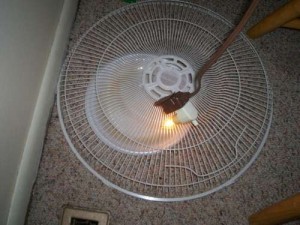
In case you get bitten by a flea, make sure to take proper care of the bite; otherwise, it may lead to infection. Wash the area with warm water and soap, apply an antiseptic and avoid scratching, as that may worsen the condition. Sometimes, people may get affected by fleas as the parasites start infesting human hair. Taking a thorough warm shower with an antiseptic soap and shampoo is the first thing to do in such cases.
